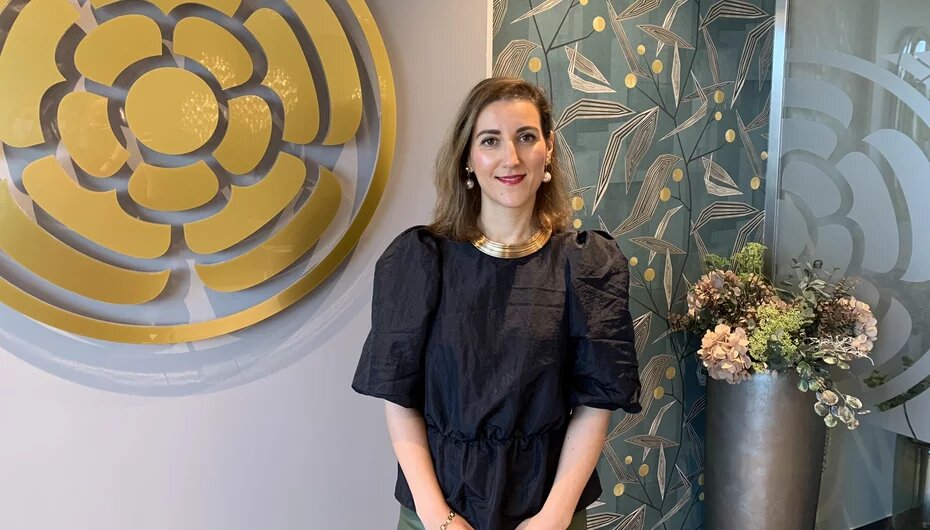Why is a client relations manager necessary in a private health care facility?
We are committed to providing a higher level of service to our customers, which is why we need an independent, customer-centric approach within management. Representing this approach, I manage Dr. Rose Private Hospital’s telephone customer service, its three-story reception, the team that liaises with health insurers, the colleagues who organize the surgeries, and the client billing team — practically everyone who meets our clients as a non-healthcare worker within our institution.
What makes the care you receive as a patient visiting a private hospital different?
Perhaps the most important feature of private healthcare is that we have the opportunity for personal contact and care. What sets us apart from others is the great emphasis on perfecting this care. From the very first moment, from the appointment, we pay attention to personal needs and our customers benefit from the extra care, for example, we create the opportunity for them to rest while waiting, to make confidential phone calls or to work - we make sure everyone has a personalized service from the very first moment.
How is this achieved?
With countless little things and attention during care. For example, if someone has already visited us, their phone number is listed in our system, and we can greet them by their name when they call, so the conversation begins more pleasantly. When visiting in person, we pay the utmost attention to discretion regarding our customers’ personal data, as well as complete discretion during payment, which takes place at a separate pay desk. We do not use impersonal patient journey management systems, instead our colleagues accompany patients to the examinations. We also pay attention to a client’s food allergy, and we even have an independent process so that if someone went to a particular doctor for a previous year’s screening, as far as possible they should see the same doctor the following year. And naturally, if someone arrives with small children or limited mobility, our staff will be waiting in our parking lot to help with their arrival.
Why is this attitude considered important?
Our customers require attention, and it feels great for them to receive it. We respect their requests and in many cases, we refine our processes to make cooperation even more convenient and natural.
Do you also measure how well your clients are feeling?
Where the customer is the focus, it is important that well-functioning, automated processes are in the background, and we regularly examine, measure and check these processes. It is true of any service process that we share a negative opinion about a service much more easily than a positive experience. We concentrate on getting to know the opinions of all our clients. Upon completion of medical examinations or interventions we send an online patient satisfaction questionnaire to all our patients.
What are you curious about in the questionnaire?
In the questionnaire we ask about the quality of information and the helpfulness of the staff working in the call center, and about discretion, orderly appearance, helpfulness and clear communication in connection with the reception. In addition to our doctors’ orderly appearance, helpfulness and comprehensible communication, our clients also rate their professional competence. In the same way, we ask about the work of our night and day nursing staff. Extremely important is the series of questions about the condition of our services, regarding waiting times, cleanliness and the quality of food and drink. We examine a separate set of questions for outpatient care and inpatient care, and our patients can rate our various services on a 10-point satisfaction scale, with 10 being the best value.
How do customers rate Dr. Rose?
The results of the examined areas attain an average of 9.57 in the case of outpatient care and 9.73 for inpatient care, and we are especially proud of the question regarding how much the respondents would recommend us to their friends and acquaintances. On average, their support for our hospital was 9.25 points for outpatient services and 9.65 points for inpatient services. To find out more about what kind of problems may lie behind the excellent results, we further analyze the data: respondents who give a value of less than 7 for various aspects can provide their contact information so that we can get in touch with them to have the opportunity to get to know about the problematic details.
What conclusions are drawn from the results of the questionnaires?
Perhaps the most important thing is to improve our internal processes: we discuss the problems and suggestions for improvement with the department heads in a weekly meeting. The responses and opinions received are analyzed each day by the director of nursing and I, and management receives a report every six weeks on the results of the elapsed period. We consider it important to analyze and evaluate different situations.
Are the results used for employees’ further training?
Successful patient satisfaction indicators are only created if colleagues are informed, prepared, and knowledgeable about our services and problem-solving opportunities. Therefore, we hold regular operational consultations and training between the related areas, and we also take care of the stress management of our employees. The result of this, the quality of care, is perceived by our clients every day. But our ultimate goal is for all our clients, both those who have come to us for ten years and those who come to our institution for the first time, to feel amidst our pleasant surroundings, that they can heal well with us.
